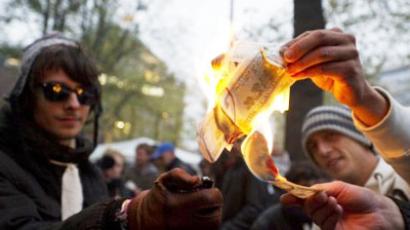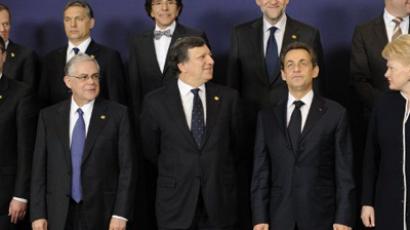Going Dutch: The Netherlands to abandon the euro?
The Dutch government has collapsed after failing to win coalition support for its austerity plans. Elections are set to be held in September and analysts say one of the EU’s strongest economies may bring the unified currency’s demise
Prime Minister Mark Rutte, a strong advocate of the Euro, has been trying to get the Parliament to adopt 14-16 billion euros worth of austerity cuts. The deficit slashing is aimed at getting the Dutch budget deficit under the three per cent of deficit to GDP limit established by the new EU fiscal pact.Rutte was unable to win the support of the far-right Freedom Party, whose leader Geert Wilders said his country should not fund the new European Stability Mechanism and, at the same time, be expected to implement Brussels’ budget deficit caps. “We don't want to cut spending by 14 billion euros and at the same time transfer billions of euros to Brussels for the horrible ESM emergency fund and the weak Greeks,” Wilders noted.At the same time, the Dutch government’s austerity measures came under criticism from the leftist opposition Labor Party. Its leader Diederik Samsom admitted that the three per cent deficit limit existed, but stressed that the Netherlands did not have to comply “if there are exceptional circumstances in the economy.”After failing to obtain the necessary support from coalition partners, Rutte, who is the leader of the center-right People’s Party for Freedom and Democracy, tendered his resignation and said new elections were likely to be held in September, after the summer break. The now-acting premier is still hoping to obtain the support of minor opposition parties to pass his legislation. Journalist Neil Clark believes the Dutch are largely angered with the fact with the EU fiscal pact that imposes deficit limits on its signatories.“The people have had enough of austerity,” Clark told RT “Holland’s GDP growth in the ten years since it’s had the Euro has just been 1.5 per cent. And they’re now being told that because of this absolutely insane fiscal pact that was agreed upon last year. It will destroy the good life that the Dutch people have been used to over the years. And unsurprisingly the Dutch are saying, it’s enough.”He also said leaving the Euro was now a possibility for the Netherlands. “I think if Holland were to leave the Euro, and that’s not such a far-fetched idea now, as it might have appeared a few years ago, then it really is game over. Because Holland has been a strong ally of Germany in the drive towards the Euro and I think it would be an enormous blow.”A number of Eurozone economies have adopted austerity measures to reduce their massive budget debts and deficits. These measures have not been met with much popular support especially in such crisis-hit countries such as Greece, Spain and Italy. The Dutch economy is in much better shape and the Moody’s agency maintains an AAA rating for the country’s economy, though it did consider the government crisis to be a “negative factor”.














